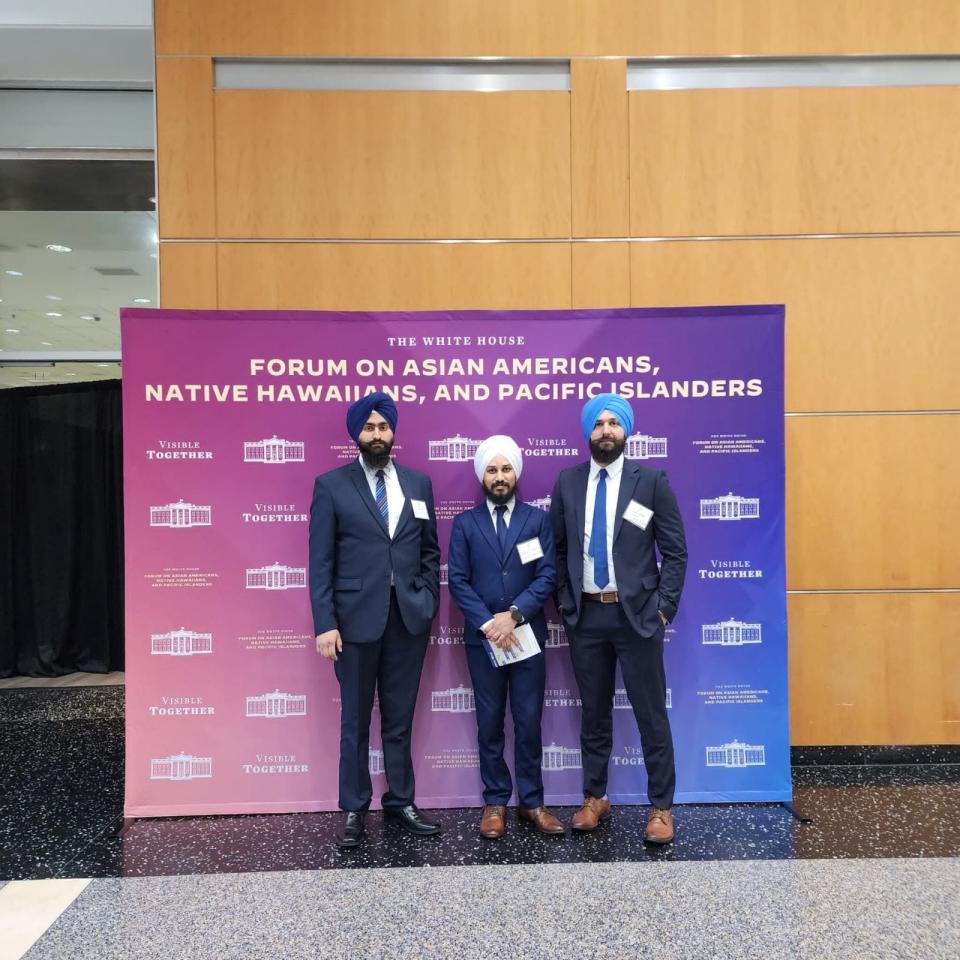Growing Sikh community wants New Jersey schools to teach more about their faith
- Oops!Something went wrong.Please try again later.
When he was elected in 2017, Hoboken Mayor Ravi Bhalla became the first mayor of the Sikh faith in New Jersey.
It was a proud achievement for the Passaic-born Bhalla — and a far cry from his time growing up in Montville Township in Morris County. He overcame bullying from kids in high school by educating them about Sikhism, he recalled.
"I remember doing what I called a 'turban-tying' class to demystify our head covering," Bhalla said. "I would take a turban to school and just show classmates this is how you tie it. You can touch it, but when it's on my head as a matter of respect, you can't touch it."
Times have progressed. After lobbying by the New York City-based Sikh Coalition and the Sikh community, New Jersey in 2009 became the first state to require that school curriculums include lessons about Sikhism.
But advocates for the Garden State's estimated 100,000 Sikh residents say that victory hasn't led to much education in the classroom. With Sikh Americans still the target of violence and harassment, a resolution that recently passed in the state Assembly seeks to change that.
AR172 urges the New Jersey State Board of Education to "require school districts to incorporate Sikhism instruction into the existing social studies curriculum." The state Commission on Asian American Heritage should also "coordinate with local school officials to develop relevant course material," the measure adds.

The resolution, co-sponsored by Assembly members Carol Murphy, Sadaf Jaffer and Raj Mukherji, was passed in June by a 75-0 vote, with support from 44 Democrats and 31 Republicans. A state Senate version of the resolution is awaiting a vote.
The Sikh Youth Alliance, a South Jersey-based organization that drafted the resolution, said there's little discussion of Sikhism in New Jersey school districts, based on a recent survey the group conducted.
Despite the 2009 decision, very few school districts adopted Sikhism in the curriculum, said Bhupindar Singh, the outreach lead for the alliance.
More: 'Turban man' slur aimed at NJ attorney general is latest indignation for state's Sikhs
More learning about Sikhism
Sikhism, or Sikhi, is a religion and philosophy that originated in the Punjab region of India in the early 16th century from the teachings of Guru Nanak. It emphasizes worshipping a single God and honoring that God by respecting others and the Earth.
Men who follow the Sikh faith are known for wearing a turban as an article of their faith, growing a beard and leaving their hair uncut. Sikh women also do not cut their hair, and most wear a covering known as a chunni or dupatta. Sikh men and women also wear a metal bracelet known as a kara as part of their faith.
There are about 25 million Sikhs worldwide, according to estimates from the Sikh American Legal Defense and Education Fund, a Washington-based group. Sikhs reside in communities such as Glen Rock in Bergen County and Carteret in Middlesex County.
Prominent Sikhs from the Garden State include Bhalla and Gurbir Grewal, the state's former attorney general and a former Bergen County prosecutor. Another is Amardeep Singh, Bhalla's brother, who co-founded the Sikh Coalition, the most well-known Sikh civil rights organization in the country.
Yet, for their achievements, Sikhs have been subjected to verbal and physical attacks, particularly after the attacks on Sept. 11, 2001. In 2012, seven members of a Sikh temple in Oak Creek, Wisconsin, were killed by a white supremacist. In 2018, Grewal was called by the slur “turban man” by radio hosts on radio station NJ 101.5.
Polarized views: Indian PM Modi's visit highlights polarized views among NJ's Indian Americans
In September 2009, the New Jersey Board of Education adopted a statewide curriculum standard for students learning world religions to include Sikhism. That followed a six-year campaign led by Sikh advocacy groups, including the Sikh Coalition.
But in February, the Sikh Youth Alliance did an electronic survey of 522 public school students who worship at 10 Sikh temples, known as gurdwaras, in the state, such as the Glen Rock Gurdwara and the Guru Nanak Mission Gurudwara in Oakland. According to Bhupindar Singh, a majority of those who responded said they learned little or nothing about Sikhism in school.
"We are overshadowed by Chinese American history, Filipino history, Cambodian and Vietnamese history," Singh said. "We are a small community out there ... And Sikhs are one of the most targeted communities for hate and bigotry."
Singh and his Sikh Youth Alliance associates have become more hopeful recently, as meetings with the Mount Laurel Board of Education in Burlington County and the Franklin Township Board of Education in Somerset County have brought promises that their religion will become part of the social studies curriculum in various grades.
The New Jersey Department of Education did not respond to questions from NorthJersey.com about how many school districts in the state have Sikhism in their curriculum or about the resolution in the Legislature.

The agency, in an email, instead referred to the 2020 New Jersey Student Learning Standards calling for “the instruction of world religions."
"The standards specifically identify Sikhism,” department spokesperson Laura Fredrick said, adding that it’s “the responsibility of local educational agencies to develop and implement curriculum.”
Bhalla, who was reelected mayor in 2021, hopes the resolution encourages more school districts to follow through.
"This is by no means symbolic in nature. This is very meaningful," he said. "It's meant to raise the bar, to make further progress, and hopefully teach the teachers as well about the Sikh faith so that they can educate the students."
Correction: A previous version of the story incorrectly stated that New Jersey adopted legislation in 2009 requiring that Sikhism be included in school curriculums; the requirement was in fact adopted by the state Board of Education. Also, an incorrect reference to "turban-time" was changed to to "turban-tying."
Ricardo Kaulessar covers race, immigration and culture for NorthJersey.com. For unlimited access to the most important news from your local community, please subscribe or activate your digital account today.
Email: kaulessar@northjersey.com
Twitter: @ricardokaul
This article originally appeared on NorthJersey.com: NJ Sikhism resolution encourages schools to teach about Sikh faith

